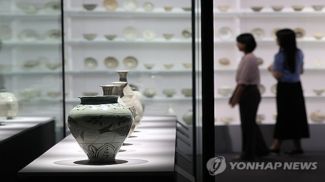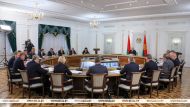BEIJING, 27 September (BelTA - China Daily). - Beijing classical music showpiece postponed but celebrations for milestone go ahead, Chen Nan reports.
October is the main season for classical music fans in the capital as the annual Beijing Music Festival usually provides a fascinating soundtrack and always features world-class performers and concerts.
However, the 25th Beijing Music Festival has been postponed this year, according to a statement released by the Beijing Music Festival Organizing Committee.
"Due to the impact of the COVID-19 pandemic, the 25th BMF will be postponed after careful consideration," the statement says. "Along the way, the BMF has received support and patronage from all sectors of society and audiences, and has jointly created many beautiful memories. We would like to extend our respect and sincere thanks to all of you and will treasure this support and expectation to the moment of meeting again."
According to the committee, the programs, which were originally planned for this year's festival, will be rearranged and staged in 2023.With more new programs being mapped out, the festival will contain a large number of events in 2023.
Nonetheless, celebrations of the festival's 25th anniversary still went ahead with a concert at the Poly Theater in Beijing on Saturday, featuring the new work by Chinese composer Zhao Lin, Symphonic Poem: A Thousand Li (li is a traditional Chinese unit of distance) of Rivers and Mountains. It was the first time that the work was performed in Beijing.
Under the baton of conductor Yu Long, the China Philharmonic Orchestra performed in the concert, which was joined by top Chinese musicians, including Wu Tong, playing the sheng (a wind instrument and one of the oldest musical instruments in China), pipa player Zhao Cong, erhu player Lu Yiwen and pianist He Ming.
Based on A Panorama of Rivers and Mountains, the classic artwork by Wang Ximeng, who completed the landscape painting during the Song Dynasty (960-1279) at the age of 18, the music piece was commissioned by 23 Chinese symphony orchestras, premiered in Shanghai in August and later toured nationwide.
"The Beijing Music Festival, the first professional and international classical music festival in China, is a milestone for the country's classical music scene," says conductor Yu, who founded the festival in 1998. "The new work, A Thousand Li of Rivers and Mountains, is a tribute to history and times. With this work, we pay tribute to the 25th anniversary of the Beijing Music Festival, and also to the 25 years of the flourishing development of China's classical music scene."
Sheng player Wu, who played with the Silk Road Ensemble, a music project launched by renowned cellist Yo-Yo Ma, during the festival in 2018, says: "As a musician, I am very glad to be part of this festival and during the past 15 years, the festival makes music more accessible, more entertaining, and allows all of us to share emotion and passion through music.
"If we compared the 25-year-old festival to a 25-year-old person, we would see a young adult, who is strong, independent and shoulders responsibility in society. It's very exciting."
Zhao Cong, principal pipa player of the China National Traditional Orchestra, who is also the president of the company, says: "I performed at the first Beijing Music Festival when I was a student of the Central Conservatory of Music. It was an unforgettable experience. Thanks to the festival, I saw and worked with many great musicians. It offered me, then a young student, valuable experience."
Besides the Beijing concert, the 25th anniversary celebration will also be marked with a special forum hosted by the Asia Society in New York on Wednesday.
Musicians, who have worked closely with the Beijing Music Festival over the past 25 years, will join the forum, including American composer-conductor Leonard Bernstein's daughter Jamie Bernstein, composers Zhou Long, Du Yun and Zhou Tian.
They will review the achievements of the festival, especially its contribution to cultural communication between the East and the West, as well as sharing their own stories with the festival.
"Since its inception, the Beijing Music Festival has played an important part of connecting with the world and providing a platform for cultural exchange. Many plans and curations are deeply connected to the theme of linking to the world," says Zou Shuang, artistic director of the Beijing Music Festival, who will deliver an online video speech during the forum.
It all started with Yu, then a 33-year-old young and ambitious conductor, who arrived in Beijing from Hamburg, Germany, in 1997.
Born in 1964 into a musical family in Shanghai, Yu received his early musical education from his grandfather Ding Shande, a veteran Chinese composer, and went on to study at the Shanghai Conservatory of Music and the Hochschule der Kunste Berlin.
"At that time, I wanted to do something, which was pioneering and no one ever did before. I shared my vision with some of my friends and one idea came to me: Is it possible to launch a professional and international music festival in Beijing?" recalls Yu.
Then in October 1998, the first Beijing Music Festival kicked off. Ensembles and renowned musicians from more than 10 countries, such as Germany, France, Russia and the United States, joined the festival with top Chinese musicians for two-week-long programs ranging from operas, chamber music to recitals.
At that time, the classical music scene in China was quite different with smaller audiences and fewer venues for classical music compared to today's booming scene. Yu, along with his team, worked hard to keep the festival going. Since it was launched in 1998, the festival has been held in Beijing every autumn, which is credited with popularizing classical music in China and fostering a new generation of classical musicians and music lovers.
In the past 24 years, the festival has commissioned 22 works with composers from home and abroad, such as Howard Shore, Aaron Zigman, Tan Dun and Chen Qigang. In 2002, the festival introduced its China Concept program, which brings Chinese musicians and their works to the world.
So far, the festival has staged 56 opera productions, 36 of which were premiered. For example, in 2005, the festival gave the Chinese premiere of the full cycle of Richard Wagner's Der Ring des Nibelungen. Since then, the festival has presented German and Austrian operas by Wagner and Richard Strauss. To attract bigger audiences, the festival has been bringing classical music to Beijing's urban landmarks, such as the popular commercial area Sanlitun and the Great Wall.
Supporting and offering opportunities for young musicians have always been a key mission for the festival, Yu says.
"From a young conductor in his early 30s to a conductor who is approaching 60 years old, I devoted my best 25 years to the Beijing Music Festival. I feel very happy," says Yu, who stepped down from the position of the festival's artistic director and handed it over to Zou in 2018.













